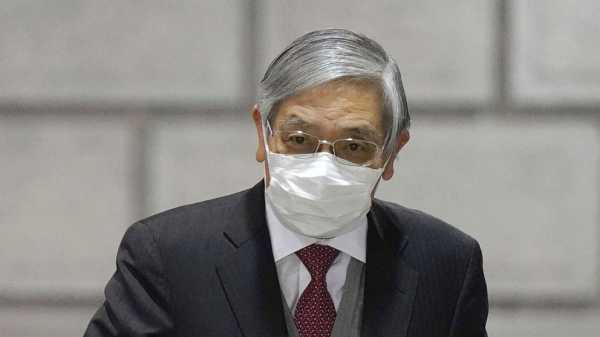
BANGKOK — Asian shares advanced Wednesday, with Tokyo gaining more than 2% after Japan’s central bank kept its lax monetary policy unchanged, dispelling speculation it would yield to pressure to tighten credit to counter rising inflation.
Oil prices rose and U.S. futures edged higher.
The Bank of Japan shook markets in December with a surprise widening of its target range for yields on long-term government bonds. It kept that range in its latest policy statement, despite recent cases when yields on 10-year government bonds exceeded the 0.5% upward limit.
Inflation has been more subdued in Japan than in the U.S. and many other countries, but prices have been creeping up as costs for oil and gas and other imports have risen as a global trend. Moves by other central banks to raise interest rates to snuff out decades-high inflation have pushed the value of the Japanese yen lower, another strain on Tokyo's monetary stance. With Wednesday's decision, the BOJ's key interest rate remains at minus 0.1%.
Core inflation in Japan, excluding volatile food and energy costs, is forecast to rise to 1.8% in the fiscal year ending in March, and wages have not risen much.
Expectations of a change in the longstanding policy, aimed at fending off deflation, have been building as market watchers await the departure of BOJ Gov. Haruhiko Kuroda, who is due to step down in April.
After the BOJ's announcement, the dollar gained sharply against the Japanese yen, rising to 130.82 yen from 128.17 yen.
The Nikkei 225 in Tokyo gained 2.5% to 26,801.88. Australia's S&P/ASX 200 edged 0.1% higher to 7,393.40 while the Hang Seng in Hong Kong gave up early gains to fall 0.2% to 21,609.59. The Shanghai Composite index edged 0.1% higher to 3,227.85.
Bangkok's SET gained 0.2% while the Sensex in Mumbai was up 0.6%.
On Wall Street, stock indexes closed mixed Tuesday as investors focused on a busy week of corporate earnings for insight into how much damage inflation is inflicting on the economy.
The S&P 500 slipped 0.2% to 3,990.97, ending a four-day winning streak. The Dow Jones Industrial Average fell 1.1% to 33,910.85, mostly because of a 6.4% drop in Goldman Sachs' shares after the investment bank’s results came in far below analysts’ estimates as dealmaking dried up.
Gains in technology stocks helped the Nasdaq composite eke out a 0.1% gain to 11,095.11, extending the tech-heavy index's winning streak to a seventh day.
Small company stocks gave back some of their recent gains. The Russell 2000 index fell 0.1%, to close at 1,884.29.
Markets were closed Monday for a holiday. The year has gotten off to a solid start for Wall Street after a dismal 2022, but investor sentiment could quickly turn as companies report their results for the October-December quarter.
Analysts expect companies in the S&P 500 to report a drop in profits for the fourth quarter from a year earlier. That would mark the first such decline since 2020, when the pandemic was crushing the economy.
Several banks reported encouraging financial results last week, but also said a mild recession is likely on the horizon for the U.S. economy. Among the companies reporting their latest results this week: Netflix, M&T Bank and Procter & Gamble.
Bond yields remained relatively stable. The yield on the 10-year Treasury rose to 3.54% from 3.5% late Friday. Bond and stock markets were closed in the U.S. for Martin Luther King Jr. Day on Monday.
Inflation and how the Federal Reserve will continue its fight against high prices remain the big concerns for investors as they review earnings results and corporate statements.
Wall Street will get another inflation update on Wednesday, when the government issues its December report on inflation at the wholesale level, which tracks prices before they are passed on to consumers. The government will also release retail sales data for December, which could give investors more insight into how inflation is affecting consumer spending.
Consumer inflation has been easing for six straight months, raising hopes the Fed could soon consider softening its policy on interest rates, even though it has said it will keep raising rates this year and expects no rate cuts until 2024.
In other trading, U.S. benchmark crude gained $1.00 to $81.18 per barrel in electronic trading on the New York Mercantile Exchange. It added 32 cents to $80.18 per barrel on Tuesday.
Brent crude, the pricing standard for international trading, was up 97 cents at $86.89 per barrel.
The euro slipped to $1.0780 from $1.0790.
Sourse: abcnews.go.com






